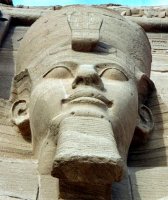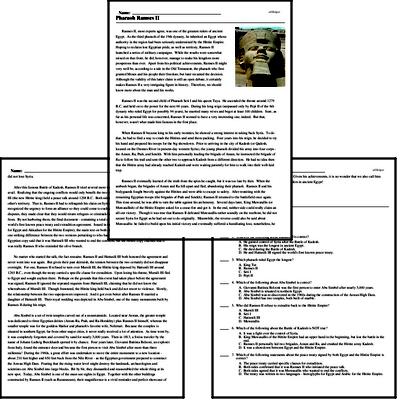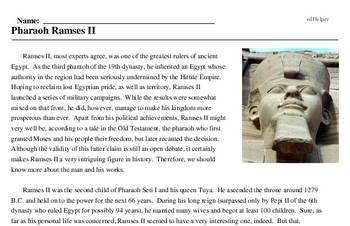Pharaoh Ramses II
Ramses II, most experts agree, was one of the greatest rulers of ancient Egypt. As the third pharaoh of the 19th dynasty, he inherited an Egypt whose authority in the region had been seriously undermined by the Hittite Empire. Hoping to reclaim lost Egyptian pride, as well as territory, Ramses II launched a series of military campaigns. While the results were somewhat mixed on that front, he did, however, manage to make his kingdom more prosperous than ever. Apart from his political achievements, Ramses II might very well be, according to a tale in the Old Testament, the pharaoh who first granted Moses and his people their freedom, but later recanted the decision. Although the validity of this latter claim is still an open debate, it certainly makes Ramses II a very intriguing figure in history. Therefore, we should know more about the man and his works.
Ramses II was the second child of Pharaoh Seti I and his queen Tuya. He ascended the throne around 1279 B.C. and held on to the power for the next 66 years. During his long reign (surpassed only by Pepi II of the 6th dynasty who ruled Egypt for possibly 94 years), he married many wives and begot at least 100 children. Sure, as far as his personal life was concerned, Ramses II seemed to have a very interesting one, indeed. But that, however, wasn't what made him famous in the first place.
When Ramses II became king in his early twenties, he showed a strong interest in taking back Syria. To do that, he had to find a way to crush the Hittites and send them packing. Four years into his reign, he decided to try his hand and prepared his troops for the big showdown. Prior to arriving in the city of Kadesh (or Qadesh, located on the Orontes River in present-day western Syria), the young pharaoh divided his army into four corps - the Amun, Ra, Ptah, and Setekh. With him personally leading the brigade of Amun, he instructed the brigade of Ra to follow his trail and sent the other two to approach Kadesh from a different direction. He had no idea then that the Hittite army had already reached Kadesh and were waiting patiently for him to walk into their well-laid trap.




